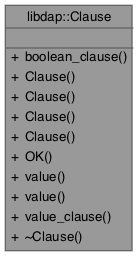Holds a fragment of a constraint expression. More...
#include <Clause.h>

Public Member Functions | |
| bool | boolean_clause () |
| Return true if the clause returns a boolean value. | |
| Clause () | |
| Clause (bool_func func, rvalue_list *rv) | |
| Clause (btp_func func, rvalue_list *rv) | |
| Clause (const int oper, rvalue *a1, rvalue_list *rv) | |
| bool | OK () |
| Checks the "representation invariant" of a clause. | |
| bool | value (DDS &dds) |
| Evaluate a clause which returns a boolean value This method must only be evaluated for clauses with relational expressions or boolean functions. | |
| bool | value (DDS &dds, BaseType **value) |
| Evaluate a clause that returns a value via a BaseType pointer. This method should be called only for those clauses that return values. | |
| bool | value_clause () |
| Return true if the clause returns a value in a BaseType pointer. | |
| virtual | ~Clause () |
Detailed Description
Holds a fragment of a constraint expression.
The selection part of a a DAP constraint expression may contain one or more clauses, separated by ampersands (&). This is modeled in the DDS class structure as a singly-linked list of Clause objects. In addition, a constraint expression may be a single function call, also represented in the DDS using an instance of Clause.
Each clause object can contain a representation of one of three possible forms:
-
A relational clause, where an operator tests the relation between two operands. This kind of clause evaluates to a boolean value. For example:
a > b. -
A boolean function, where some function operates on arguments in the clause to return a boolean value. For example, consider a scalar A and a list L. The clause
find(A,L)might return TRUE if A is a member of L (if thefind()function is defined). -
A clause that returns a pointer to a DAP BaseType value. This is a clause that evaluates to some data value (be it scalar or vector). For example,
sig0()might be included in the constraint expression parser to calculate density from pressure, temperature, and salinity. In this case,sig0(p,t,s)would be a clause that evaluates to a data value.
This might be a bit confusing; in the first, and by far more common, form of constraint expressions (CEs) only the first two types of clauses may appear. In the second form of the CE only the last type of clause may occur. The Clause class, however, can store them all.
The Clause object holds the constraint expression after it has been parsed. The parser renders the relational operator into an integer, and the functions into pointers.
- See also
- DDS::parse_constraint
Constructor & Destructor Documentation
◆ Clause() [1/4]
| libdap::Clause::Clause | ( | const int | oper, |
| rvalue * | a1, | ||
| rvalue_list * | rv ) |
◆ Clause() [2/4]
| libdap::Clause::Clause | ( | bool_func | func, |
| rvalue_list * | rv ) |
◆ Clause() [3/4]
| libdap::Clause::Clause | ( | btp_func | func, |
| rvalue_list * | rv ) |
◆ Clause() [4/4]
◆ ~Clause()
Member Function Documentation
◆ boolean_clause()
| bool libdap::Clause::boolean_clause | ( | ) |
◆ OK()
| bool libdap::Clause::OK | ( | ) |
◆ value() [1/2]
| bool libdap::Clause::value | ( | DDS & | dds | ) |
Evaluate a clause which returns a boolean value This method must only be evaluated for clauses with relational expressions or boolean functions.
- Parameters
-
dds Use variables from this DDS when evaluating the expression
- Returns
- True if the clause is true, false otherwise.
- Exceptions
-
InternalErr if called for a clause that returns a BaseType pointer.
◆ value() [2/2]
Evaluate a clause that returns a value via a BaseType pointer. This method should be called only for those clauses that return values.
- Parameters
-
dds Use variables from this DDS when evaluating the expression value A value-result parameter
- Returns
- True if the the BaseType pointer is not null, false otherwise.
- Exceptions
-
InternalErr if called for a clause that returns a boolean value. Not that this method itself does return a boolean value.
◆ value_clause()
| bool libdap::Clause::value_clause | ( | ) |
The documentation for this struct was generated from the following files: